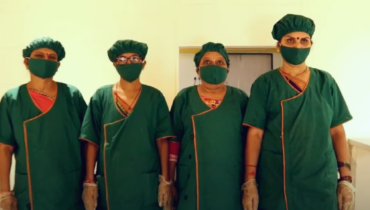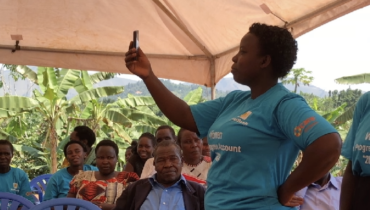Johorad [name has been changed] lives in the deep desert just under a full day’s walk from the “tarmac road”, the black asphalt highway cutting across Puntland – a state in Somalia’s northwest – the only formal transit point connecting Johorads’ community with the rest of the country and the coast. Johorad is 23 years old, married, with three children, and is the family member directly responsible for managing the goats and camels sourcing the family’s income. Johorad also walks three kilometers to climb the top of a hill four times a week so that she can get reception on her 3G mobile phone from one of the telecom towers dotting the arid landscape. Through her phone, she can connect with other women in her livestock and milk collection cooperative via SMS, and she can navigate the Internet and manage her Facebook account. Phone and the internet are so important to Johorad that at times, when income constraints force her to choose between buying batteries for a generator to light the house at night and paying her phone bill, the phone bill wins. And because she often uses this technology to manage her livestock business, Johorad’s family supports this prioritization. Yet in addition to growing her family’s business, Johorad’s phone, and through it, her ability to connect to other communities through the internet, has enabled her to develop her talent as a poet, and even gain national recognition for her writing.
Johorad went to school until class four, and she can still read and write in Somali. She has always thought in music and song, and she would jot lines of poetry on paper scraps about the house. But her world expanded drastically in the spring of 2014 when she found the Facebook page of the Puntland Women Writers Association (PWWA), based in the state capital of Garowe. Taking a leap, Johorad messaged one of the PWWA women and sent across a short poem. The association was shocked and thrilled that someone from such a far off, rural community had found out about their presence and made contact. After communicating back and forth, the PWWA was eventually able to fund Johorad coming to Garowe to present her poem as an honorary guest at the Association’s annual literary conference. This visit marked the first time Johorad had traveled to an urban setting beyond the nearest village on the asphalt highway to which she brought livestock and milk every few weeks. Today, Johorad exchanges messages with PWWA members and other women several times a week, and her writing will be included in a book of poetry and oral history collected by the PWWA and set to be published in early 2016.
Johorad’s story is just one example of how in certain contexts in Somalia, the growing availability and use of Information Communication Technology (ICT) is helping augment women’s activity in the economic and public sphere. Though unfolding in incremental steps, women’s increasing empowerment in this regard, and the inter-clan networks growing out of their activities are contributing to Somalia’s movement towards more peaceful coexistence between communities.
Women in rural areas largely manage the livestock-related businesses, and, through this, are major drivers of communication between communities in rural spaces. To overcome separation across huge geographic distances, women livestock holders have been forming milk collection collectives, where participants arrange for milk and livestock transport through semi-urban counterparts at various stops along the asphalt “tarmac road.” The increasing ubiquity of mobile phones is now helping women diversify these businesses. They are creating a socially acceptable avenue for communication with the more “downstream” parts of the livestock supply chain, such as milk processing, livestock transport, market access and distribution – businesses traditionally dominated by men.
In more urban contexts, Somali women most commonly engage in economic activity through retail entrepreneurship. Women are often seen in the public sphere running clothing and perfume emporiums, market stalls and connector businesses. Particularly in Somalia’s context of entrenched clan conflict and fighting between Somali-African Union forces and al-Shabaab, Somalis have developed a complicated security vetting process to screen new neighbors, employees, business partners and educational institution applicants. Female entrepreneurs often have to conduct particularly strenuous social vetting processes for those they associate with, given the added restrictions on women related to modesty and social reputation. Mobile phones help streamline these complicated processes. Urban women entrepreneurs have actually converted security vetting processes into a service they sell as part of the “connector services” product suite. Already being mavericks simply by nature of their non-traditional client-facing role allows Somali women entrepreneurs to push boundaries in other ways. Anecdotal evidence suggests that, proportional to the amount of women in the workforce, it is more common for Somali women to enter into a business partnership outside their own particular community or sub-clan than for men to do the same.
Somali women in both rural and urban contexts are increasingly using communication as an entry point into the economic space. Furthermore, they are using mobile phones as a tool for doing so, and their economic activity bridges social gaps between disparate communities. Linkages between communities build rapport between community members that disincentives escalation of violent conflict. The improved economic opportunities available to rural communities out of women’s increased involvement in different parts of the livestock supply chain helps satisfy some of the economic grievances associated with violent conflict. Research suggests that in areas where women’s communication-based economic activity is more robust, inter-community conflict and revenge-based violence has been on the decline.
Johorad’s experience using mobile phone technology to grow her family’s business and her own artistic pursuits gives us one tiny glimpse into how the use of information communication technology is changing women’s role in Somali society. This change in roles is both improving women’s overall position and strengthening community linkages necessary for maintaining sustainable peace. Though community backlash towards women’s increasing economic activity is prevalent, ICT is making it socially and logistically easier for women to create bonds between their communities and between each other. As Somalia moves closer toward its 2016 elections, women politicians might find new opportunities for engagement and have a particularly important role to play. Women’s increasing use of ICT to link with other women and society at large may continue to develop and contribute to these and other socio-political tides.


